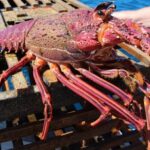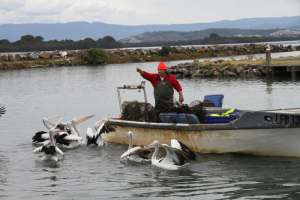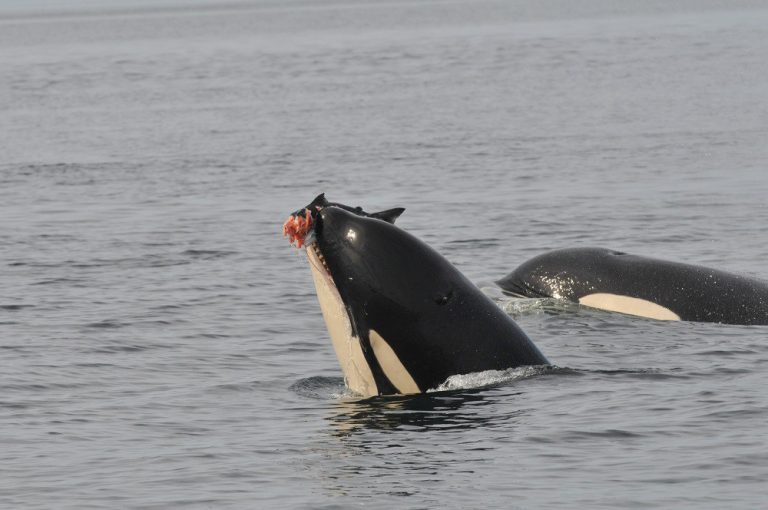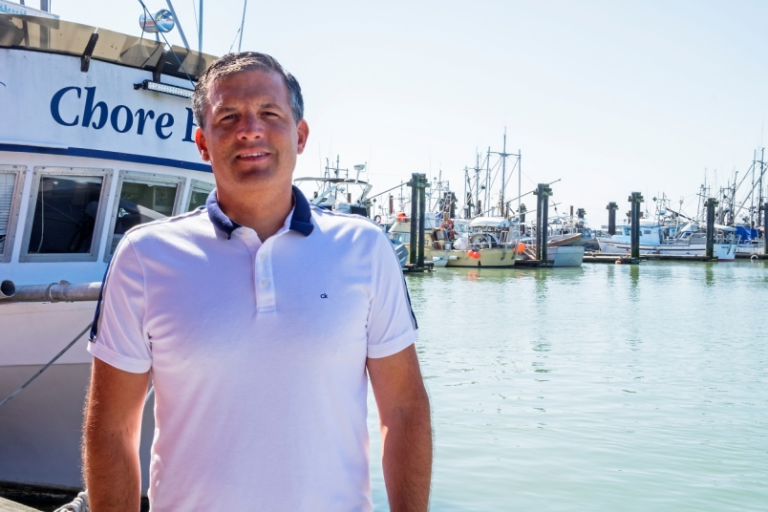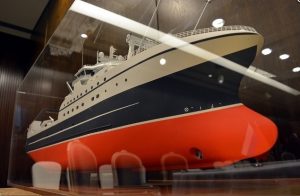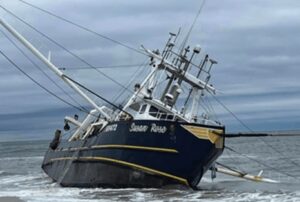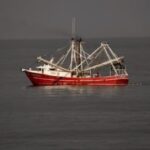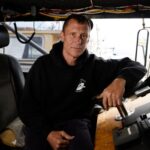Tag Archives: Amy Knowlton
A treasured industry and an endangered species compete for survival
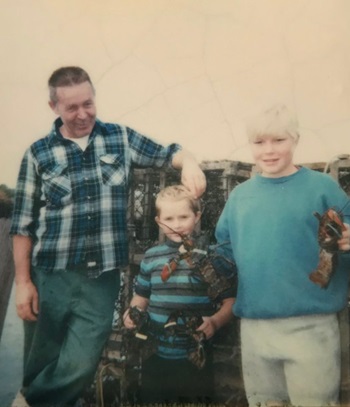 On a cold morning in January, Chris Welch is already out preparing his boat. This time of year, his days begin before sunrise. It’s a ritual he’s grown accustomed to — at just 35 years old, he’s already spent decades working in the lobster business. “I started lobstering when I was six.” Welch said. Being a lobsterman in Maine is less of a job and more of a lifestyle. It’s a family business for many, including Welch, whose learned the ropes from his grandfather. But recently, the focus is less on what lobstermen’s ropes are pulling up and more on what may be running into them. Video, more, >>click to read<< 10:23
On a cold morning in January, Chris Welch is already out preparing his boat. This time of year, his days begin before sunrise. It’s a ritual he’s grown accustomed to — at just 35 years old, he’s already spent decades working in the lobster business. “I started lobstering when I was six.” Welch said. Being a lobsterman in Maine is less of a job and more of a lifestyle. It’s a family business for many, including Welch, whose learned the ropes from his grandfather. But recently, the focus is less on what lobstermen’s ropes are pulling up and more on what may be running into them. Video, more, >>click to read<< 10:23
Aquarium scientists ID dead whale found on Martha’s Vineyard
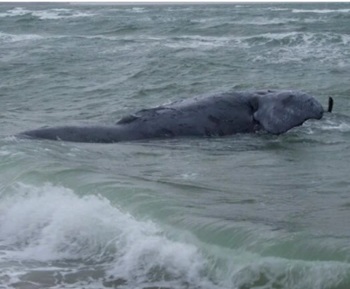 Scientists identified the dead North Atlantic right whale as a 3-year-old female known as #5120. NOAA Fisheries learned that the unnamed whale had washed ashore near Joseph Sylvia State Beach on Martha’s Vineyard on Jan. 28. The animal will undergo a necropsy this week to determine its exact cause of death. The Wampanoag Tribe of Gay Head (Aquinnah) and the International Fund for Animal Welfare secured the whale, according to the aquarium. State law enforcement officials also collected rope entangled around and embedded in the whale’s tail and turned it over to NOAA’s Office of Law Enforcement. In August 2022, researchers found the whale tangled up in fishing gear in the Gulf of St. Lawrence, Canada. Several attempts were made in January and February of 2023 to disentangle the whale after she was located off Cape Cod. more, >>click to read<< 13:01
Scientists identified the dead North Atlantic right whale as a 3-year-old female known as #5120. NOAA Fisheries learned that the unnamed whale had washed ashore near Joseph Sylvia State Beach on Martha’s Vineyard on Jan. 28. The animal will undergo a necropsy this week to determine its exact cause of death. The Wampanoag Tribe of Gay Head (Aquinnah) and the International Fund for Animal Welfare secured the whale, according to the aquarium. State law enforcement officials also collected rope entangled around and embedded in the whale’s tail and turned it over to NOAA’s Office of Law Enforcement. In August 2022, researchers found the whale tangled up in fishing gear in the Gulf of St. Lawrence, Canada. Several attempts were made in January and February of 2023 to disentangle the whale after she was located off Cape Cod. more, >>click to read<< 13:01
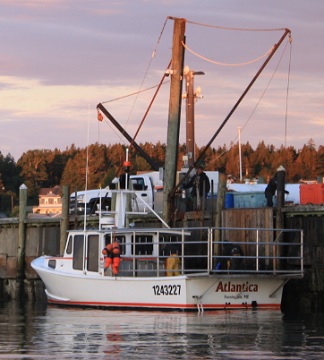
Maine wants to transform how the US manages the lobster fishery.
Patrick Keliher, Maine’s Department of Marine Resources commissioner, has argued that the fishery needs more “tools in the toolbox.” Now, with the most time he’s had in recent memory to sit down and craft new measures, he is hoping that the dawn of “dynamic management” in Maine is here. What is dynamic management? In theory, it’s a simple strategy to keep fishermen fishing, while also making way for whales. The Gulf of Maine would be monitored, with listening devices in the water and planes in the sky, for right whales. If signs of right whales are detected, fishermen would have to clear their traps out of the area. Dynamic management has been pitched by Maine before, and a version of it is being used in parts of the Canadian snow crab fishery. >click to read< 14:35
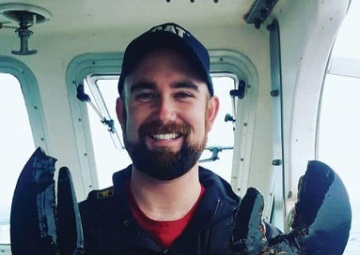
Lobster industry and lawmakers await court decision to determine legality of new restrictions
Maine and Massachusetts harvest more than 90% of the American lobsters sold in the U.S. and most lobstermen and New England lawmakers want to keep it that way. Over the past year, a dispute over new federal regulations on Maine’s lobster industry, intended to protect the endangered North Atlantic Right Whale,,, Mike Sargent became the captain of his own boat at 15. The 29-year-old is worried, however, that if regulations adopted by the National Oceanic and Atmospheric Administration in 2021 are ruled lawful by the U.S. District Court of the District of Columbia, that more expensive and stricter regulations could follow. “There’s talks of ropeless fishing and so on, and those are astronomically expensive and quite frankly could bankrupt this industry at the stroke of a pen,” Sargent said. Massachusetts lobsterman Dave Casoni said that it would cost lobstermen between $500,000-$600,000 to make the switch to ropeless traps, and if passed Casoni believes it could bankrupt the industry. Video, >click to read< 09:16

Gulf of Maine: Lawsuits over North Atlantic right whale regulations coming to boil
Lobsterman Brian Cates lives so far at the edge of Maine he can look out the windows of his house and see Canadian boats out in Canadian waters. Cates and other New England lobstermen are worried about how the coming regulations issued by the National Marine Fisheries Service will affect their livelihoods. Cates fishes in disputed waters. There, around the mouth of the Bay of Fundy, there’s a strip of ocean claimed by both Canada and U.S. alike called the grey zone. Cates fishes up against Canadian lobstermen, their traps and lines often getting caught up on one another. And the rules coming down from the federal government are not helping, >click to read< 19:14
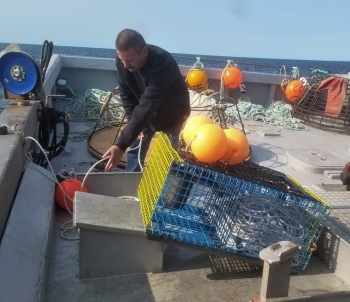
At the Ropeless Consortium’s second annual meeting
Scientists, fishermen and policy makers met on Wednesday in Maine to discuss this issue at the Ropeless Consortium’s second annual meeting. The North Atlantic Right Whale Consortium will continue the discussion of right whale conservation at their annual meeting Thursday and Friday.,,, “We here at the aquarium have been working hard on looking at reducing rope strengths and trying to get rope-less fishing as an option to reduce risk,” said Amy Knowlton, a Ropeless Consortium board member and senior scientist at the New England Aquarium. >click to read< 10:35
SeaWorld & Busch Gardens Conservation Fund Commits $900,000 to Protect Critically Endangered North Atlantic Right Whales – The announcement was made by Dr. Michael Moore of the Woods Hole Oceanographic Institution, during yesterday’s 2019 Ropeless Consortium meeting, >click to read<
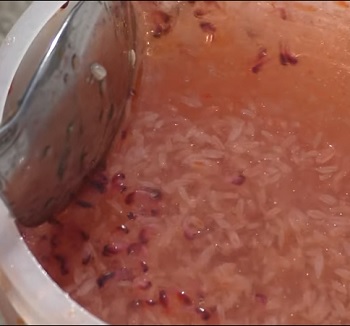
Experts track right whale behavior in new trouble spot
Scientists from the U.S. and Canada have returned from a North Atlantic right whale survey trip in the southern Gulf of St. Lawrence where they found dense reserves of zooplankton that have drawn 70 or more of the critically endangered marine mammals to the region this summer. They now expect the right whales to move farther north in the coming summers to follow the movement of the food they consume,,, Many of the right whales that visit Cape Cod Bay and south of the islands in the late winter and early spring migrate northward as they follow the movement of zooplankton, especially a rice-sized copepod called calanus. >click to read< 09:58

Scientists and fishermen team up to help save North Atlantic right whale
Whale researchers and fishermen are out at sea together on a two-week mission, combining efforts to help save the endangered north Atlantic right whale. These two worlds have usually stayed far apart, but for the first time scientists are onboard a crab boat to do their field work. Crab fisherman Martin Noel, captain of the Jean-Denis Noel boat in Shippagan, agreed to take scientists out in the gulf to help them carry out their research this year. “We don’t want to be called whale killers,” Noel said. “We want to be called fishermen that are implicated in the solution.” All season, fishermen begged Ottawa to involve them in fisheries management. They felt the federal government was imposing overly strict measures without consultation with industry. >click to read<09:28
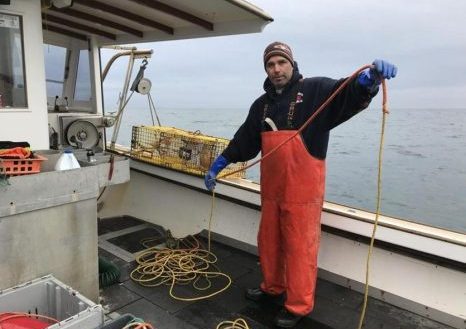
Can anyone save the North Atlantic right whale? A group of South Shore lobstermen say they know what the answer is
By the time Mike Lane shoves off the Cohasset docks, it’s past 8 a.m. — practically lunch time for a lobsterman. But it’s early spring, and the South Shore fisheries are mostly closed, so Lane is keeping a somewhat relaxed schedule. Lobsters tend to hole up for the season several miles farther offshore, and Lane would like to be there, fishing his 800 traps. That area also happens to be a feeding area for North Atlantic right whales — one of our planet’s most endangered species. And so, four years ago, the federal government closed these grounds for much of the winter and spring. That means all Lane can do right now is set a few traps in a small area just outside Cohasset Harbor. >click to read<11:37
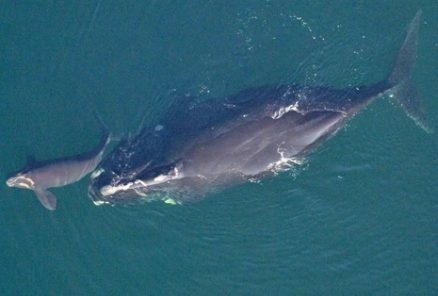
Gear is in wrong place for right whales, scientists say
Speaking at the Maine Fishermen’s Forum on Friday,,, The NOAA Fisheries Large Whale Take Reduction Team recently established separate working groups to study two proposals to reduce the risk of entanglement: splicing several 1,700-pound breaking strength “weak link” sleeves into vertical lines such as those that connect lobster buoys to traps; and removing those ropes altogether by requiring the use “ropeless” fishing gear. Those working groups will focus on whether either solution is technologically feasible, whether it will actually work for fishermen, and whether it can be cost effective for fishermen.,, >click to read<10:32
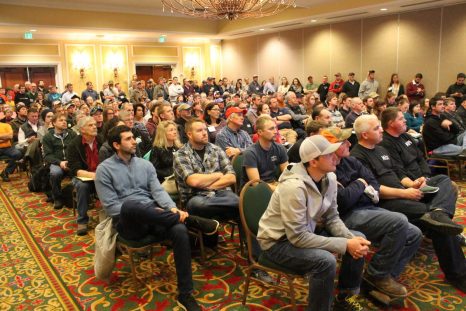
Lobstermen pack meeting concerning right whales, possible gear changes at the Maine Fishermen’s Forum
Lobstermen from all over the state packed the Rockport Room at the Samoset Resort to overflowing Friday to hear about the potential for ropeless fishing and use of break-away lines to help save the endangered right whale. The panel discussion March 2 at the annual Maine Fishermen’s Forum brought fishermen together with several experts including scientist Mark Baumgartner of Woods Hole Oceanographic Institute, Amy Knowlton of the New England Aquarium and Mike Asaro of NOAA Fisheries. >click to read< 10:06
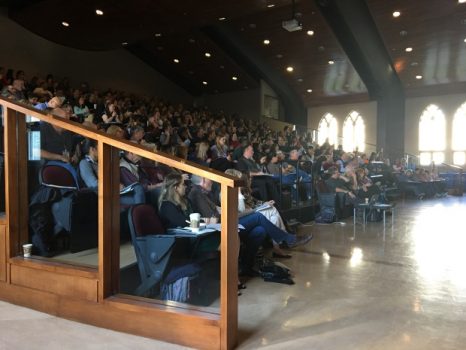
North Atlantic Right Whale Consortium – scientists say Right whales could be 20 years away from certain extinction
Scientists at an annual meeting for North Atlantic right whales estimate the species has a little over two decades left to survive unless changes are made immediately. The North Atlantic Right Whale Consortium’s annual meeting was held in Halifax on Sunday, and all of the scientists spoke with a sense of urgency about the fate of these whales. This summer, at least 15 right whales died in Canadian and U.S. waters and scientists at the conference stressed that human activity is the primary cause of death for all right whales. click here to read the story 11:21


































